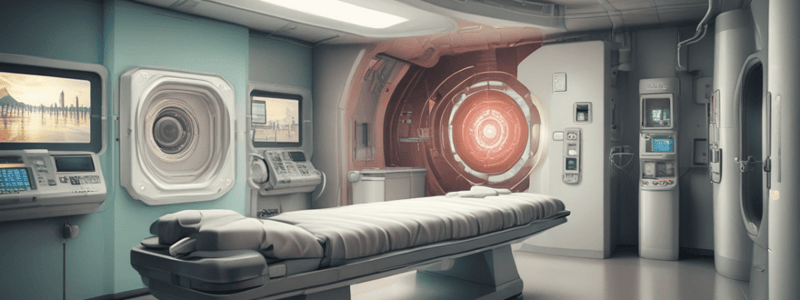Podcast
Questions and Answers
What is the purpose of a flood field or sheet phantom in a gamma camera?
What is the purpose of a flood field or sheet phantom in a gamma camera?
- To analyze the performance of individual photomultipliers
- To measure the level of background radiation
- To detect contamination of the gamma camera
- To check the uniformity of the detector response (correct)
What is the advantage of using 57Co in a flood field or sheet phantom?
What is the advantage of using 57Co in a flood field or sheet phantom?
- It is less expensive than 99mTc
- It has a shorter half-life than 99mTc
- It has a similar gamma emission to 99mTc but is longer-lived (correct)
- It is more easily available than 99mTc
What does a defective photomultiplier tube appear as in a flood field image?
What does a defective photomultiplier tube appear as in a flood field image?
- A linear defect
- A circular defect
- An area of increased counts
- An area of reduced counts (correct)
What is the purpose of regular checks on the photomultipliers?
What is the purpose of regular checks on the photomultipliers?
What does a high reading obtained with the collimator in place indicate?
What does a high reading obtained with the collimator in place indicate?
What can cause a linear defect in a flood field image?
What can cause a linear defect in a flood field image?
Flashcards are hidden until you start studying
Study Notes
Uniformity of Detector Response
- A conventional gamma camera is expected to provide a uniform response to a uniform field, which is checked using a flood field or sheet phantom.
- A flood field consists of a flat, sealed plate larger than the field of view (FOV), typically filled with cobalt-57 (57Co).
- Cobalt-57 has a similar gamma emission to technetium-99m (99mTc) but has a longer half-life.
- The flood field test should produce a uniform image with the collimator in place, allowing identification of defective photomultipliers as areas of reduced counts.
- Crystal defects, such as cracks, appear as linear defects in the image.
- Non-uniformity due to minor differences in photomultiplier performance is analyzed by counting pixels, and image data can be automatically compensated based on this analysis.
- Regular checks are necessary to monitor photomultiplier deterioration over time.
Background Radiation Checks
- Background radiation checks help identify contamination on the gamma camera or collimator, or the presence of a local unshielded source.
- High readings, regardless of camera orientation, indicate contamination on the crystal or camera head.
- Subsequent high readings, obtained with the collimator in place, suggest collimator contamination.
Studying That Suits You
Use AI to generate personalized quizzes and flashcards to suit your learning preferences.




